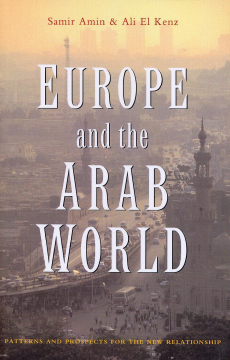
Additional Information
Book Details
Abstract
Europe and the Arab World is a wide-ranging assessment of the prospects for a new relationship between Europe and the Arab world in the coming years. Samir Amin and Ali El Kenz take as their starting point the significantly shifting balance of political forces within the various Arab countries, including the rise of both political Islam and civil society. They argue that the strategic global hegemony of the United States constitutes a major element affecting the Euro-Arab relationship. They then focus on the European Union initiative, originally launched in Barcelona, to put its relations with the Arab countries of the Mediterranean and Gulf regions on a new footing of equality and mutually beneficial cooperation. The authors provide a detailed empirical account of the initiative as well as an historically contextualized, intellectually critical and politically perceptive analysis of the various realities impacting on it.
Samir Amin and Ali El Kenz conclude that, while considerable dialogue and even institution-building have taken place in order to give substance to this attempt to go beyond the colonial legacy of inequality and dependence, little of a concrete kind has been achieved in transforming the underlying economic and political relationships between the Arab Islamic and European Christian worlds of the Mediterranean. Among the many obstacles identified are the overriding and economically deleterious impact of globalized capitalism, and the determination of the United States to impose its own political objectives on the Middle East.
The timeliness of this book's argument is highlighted by the new tensions that have accompanied the U.S. military occupation of Iraq and the Bush administration's political pretensions to 'bring democracy' to the whole region.
'These essays offer a forceful indictment of the European attempt since 1995 to put the relationship with neighbouring Arab countries on a more equitable footing.'
The International History Review
Samir Amin has a worldwide reputation as one of the foremost radical thinkers of our generation. Among his many institutional roles, he has been director of IDEP (the United Nations African Institute for Planning) from 1970 to 1980; the Director of the Third World Forum in Dakar, Senegal; and a co-founder of the World Forum for Alternatives. His most famous works are Accumulation on a World Scale and Unequal Development. Among his recent books in English are Re-reading the Post-War World: An Intellectual Itinerary (1994) and Empire of Chaos (1993). Ali El Kenz is Professor in Sociology in Nantes University, France. His work is focused on Arab research in the social sciences and he has published books, chapters and articles in both French and Arabic.
Table of Contents
| Section Title | Page | Action | Price |
|---|---|---|---|
| Cover | Cover | ||
| Contents | v | ||
| Acknowledgements | vi | ||
| 1 | The Arab world: a balance sheet of the present situation and struggles | 1 | ||
| The autocratic state faced with the challenge of modernity | 1 | ||
| Political Islam | 5 | ||
| Political conflicts snd social struggles | 9 | ||
| The ‘third sector’ of the social reality | 27 | ||
| Community associations: a genuine burgeoning or a smokescreen? | 31 | ||
| Geo-strategy, Arab unity and Palestinian intifadas | 38 | ||
| 2 | The Mediterranean-Gulf region: some international policy problems | 50 | ||
| The strategic hegemony of the United States | 50 | ||
| Europe and the Arab Mediterranean to the south | 57 | ||
| After the Soviet collapse and the Gulf and Yugoslav wars | 69 | ||
| Notes | 73 | ||
| 3 | Euro-Mediterranean relationships: globalization and regionalization | 74 | ||
| Globalization and regionalization | 77 | ||
| The Euro-Mediterranean partnership: fiction and fact | 82 | ||
| The Euro-Mediterranean project: beyond the discourse | 98 | ||
| The real issues at stake in the Euro-Mediterranean project | 116 | ||
| The Barcelona compromise | 122 | ||
| Notes | 125 | ||
| 4 | On the Euro-Mediterranean partnership | 131 | ||
| The Arab world fossilized in its powerlessness | 131 | ||
| The ‘Euro-Mediterranean’ partnership | 134 | ||
| Appendix: Basic data on the Arab world | 139 | ||
| Population data | 139 | ||
| Human Development | 139 | ||
| Health | 140 | ||
| Education and access to communication | 141 | ||
| Urbanization | 141 | ||
| Employment | 141 | ||
| Economy | 142 | ||
| Direct investments in the Mediterranean region (in millions $) | 143 | ||
| Direct foreign investment in the Mediterranean region (in % of gross capital formation) | 143 | ||
| MEDA commitments in 1998 (in €) | 144 | ||
| Morocco - indicative programme 1996-98 | 144 | ||
| Egypt: indicative national programme (updated 1997-99) | 145 | ||
| Tunisia - indicative programme 1996-98 | 146 | ||
| Algeria - indicative programme 1996-98 | 146 | ||
| Distribution of successive commitments and payments | 147 | ||
| Structural adjustment and privatization | 150 | ||
| The association agreements | 151 | ||
| Sources and bibliography | 152 | ||
| Important publications by the ARC (Cairo) | 152 | ||
| Other research and publications | 153 | ||
| Other research concerning Egypt | 154 | ||
| Information centres | 157 | ||
| Index | 158 |
